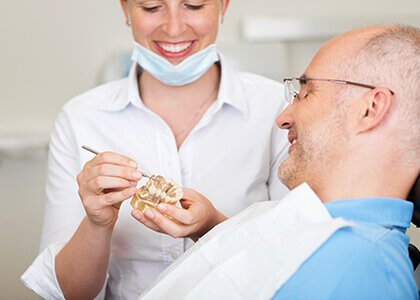Indianapolis dentist discusses the role of dentures in restoring missing teeth
Dentures, traditionally known as false teeth, have a long and fascinating history, dating back to 700 BC when northern Italians fashioned partial prosthetics from animal or human teeth held together with gold bands. In the 16th century, full sets of wooden teeth, held in place with soft and hardened bees wax, were invented by the Japanese. Over time, dentures evolved and the concept of adhesion was improved upon, with false teeth being made from pagodite, or horns of animals, including ivory.

George Washington notoriously wore dentures made from elephant and hippopotamus ivory, human teeth, and gold. Early specialists in this dental work were those dealing in ivory, professional goldsmiths, or barber-surgeons. By the 20th century, dentures were being made with plastic and resins.
While individuals today are able to keep their teeth healthier, tooth loss can still occur due to decay, extraction, gum disease, malnutrition, and trauma. Modern dentures are natural looking and affordable solutions that can help patients restore oral function, such as:
- Self-confidence and appearance
- Facial balance and support for the lips and cheeks to avoid a sunken in look
- Ability to chew and bite comfortably
- Restored speech
At Washington Street Dentistry, serving patients from greater Indianapolis, East Indianapolis, Cumberland, Greenfield, Anderson, New Palestine, and nearby communities, Dr. Matthew Church and our gentle, professional team provide a complete range of pediatric, family, geriatric, cosmetic, emergency, sedation, surgical, and restorative dentistry, including dentures.
There are two main types of modern dentures, full or partial.
Full dentures
Full dentures, also called complete dentures, restore an entire arch of teeth. Full dentures may be conventional or immediate. With conventional dentures, any remaining teeth are extracted and the prosthetic is not placed until after the gums have healed completely. Immediate dentures, as the name implies, are custom-made in a dental laboratory prior to the removal of the teeth and are placed immediately following extractions. Adjustments may be necessary on either type of full denture as the bone or gums may recede slightly.
Partial dentures
When healthy teeth remain around a number of missing teeth, a partial denture, which is similar to a dental bridge, may be recommended.
Dentures can be removed for daily cleaning and optimal oral hygiene.
For more information about restoring your smile with dentures, contact our friendly dental professionals at (317) 890-4455 today.
Share this Article
Back to Dentures Page





